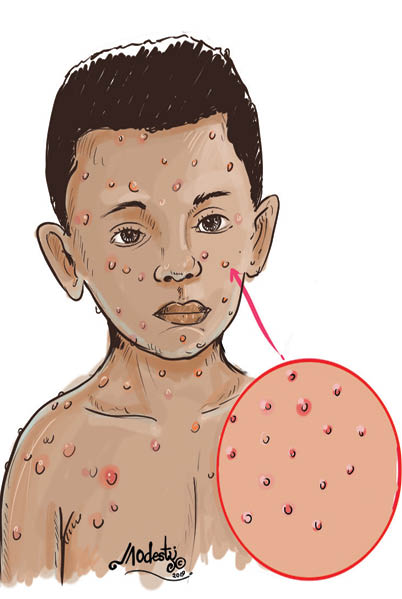Permit me a space in your dedicated weekly column to ask about a health issue that affects young people. I believe you can address it. I am 23 years old and my sister is 18. We wish to know about pimples, especially the cause and how to prevent and cure it.
Patricia X.
Thanks for your question, Patricia and you are right, our health column serves everybody, the young, the middle aged and the older populations. I will provide simple information on the matter. Majority of young people in their teenage age get pimples as they are growing. It is also called acne. It happens when an oily substance called sebum clogs pores. Acne is a skin condition that occurs due to the overproduction of oil by the oil glands of the skin.
Why do some people get acne and others don’t?
It is not clear why some people are more prone to acne than others.
The exact cause of acne is not known, but hormones called androgens can play a role.
1. Androgens increase in both boys and girls during puberty. Androgens make the skin’s oil glands get larger and make more sebum. Androgens also can increase because of hormonal changes related to pregnancy or starting or stopping birth control pills.
2. Genetics may also matter. If one’s parents had acne, you may have inherited that tendency.
3. Some medications (for example androgens taken as medicine) cause acne.
4. Cosmetics that have a greasy consistency may also clog pores. Water-based products are less likely to cause acne than oil-based makeup.
Some causes of Acne?
To understand acne, you need to know how your skin works. The pores in your skin contain oil glands.
1. When you hit puberty, there’s an increase in sex hormones called androgens. The excess hormones cause your oil glands to become overactive, enlarge and produce too much oil, or sebum. When there’s too much sebum, the pores or hair follicles become blocked with skin cells. The increase in oil also results in an overgrowth of bacteria called Propionibacterium acnes.
2. If blocked pores become infected or inflamed, a pimple, a raised red spot with a white centre forms. If the pore clogs, closes, and then bulges, you have a whitehead. A blackhead occurs when the pore clogs, stays open, and the top has a blackish appearance due to oxidation or exposure to air. (This has nothing to do with skin being “dirty”).
3. When bacteria grow in the blocked pore, a pustule may appear, meaning the pimple becomes red and inflamed. Cysts form when the blockage and inflammation deep inside pores produce large, painful lumps beneath the skin’s surface.
4. Hormonal changes related to birth control pills, menstrual periods, and pregnancy can trigger acne. Other external acne triggers include heavy face creams and cosmetics, hair dyes and greasy hair ointment – all of which can increase blockage of pores.
How is Acne treated?
1. Nonprescription (“over the counter”) topical treatments: “Topical” means that you put these products on your skin. They’re not pills. These include acetic acid, salicylic acid and sulfur. These treatments are available in many forms including gels, lotions, creams, soaps and pads. When these products are used regularly, they are moderately effective in treating acne. It may take 4-8 weeks for skin to improve.
2. Prescription of topical treatments such as antibiotics
3. Prescription of oral drug treatments: For people with moderate to severe acne, doctors often prescribe oral antibiotics (pills) in addition to topical medication. Oral antibiotics are thought to help control acne by curbing the growth of bacteria thereby decreasing inflammation.
4. Cysts can be treated with a series of intralesional cortisone injections.
How to prevent it?
1. Don’t over-wash or use harsh scrubs. Acne is not caused by dirt. Two gentle washings a day is enough. Too much cleaning can leave skin irritated and dry, triggering glands to produce more oil, increasing the likelihood of pimples.
2. Use oil-free products (those that won’t clog pores) on your face.
3. Don’t squeeze or pick blemishes. Popping pimples can drive acne bacteria deeper into the skin. Picking can lead to more inflammation and permanent scarring.



